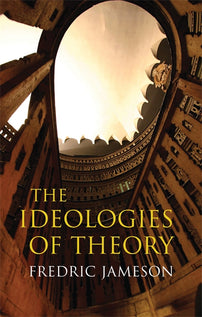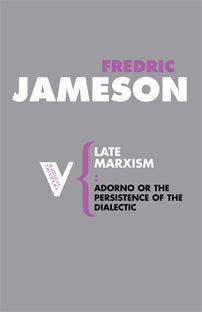Deep Listening
For the sixth instalment of our Jameson at 90 series, Phillip E. Wegner discusses Fredric Jameson's The Ideologies of Theory.

The 1988 two-volume edition of The Ideologies of Theory has always occupied a special place for me, as it was foundational for my intellectual development. It appeared in a productive period for Fredric Jameson working with the preeminent theory publisher, the University of Minnesota Press. The 2008 combined and expanded Verso edition also includes Jameson’s forwards to three of the eighty-eight volumes in Minnesota’s Theory and History of Literature (1981-1997) series: Jean-François Lyotard’s The Postmodern Condition (1984), Jacques Attali’s Noise (1985), and A.J. Greimas’ On Meaning (1987). The first was published at a major turning point in Jameson’s project, as the year also witnessed the appearance of a series of essays on the situation of the contemporary—or, postmodernism—two of which, “The Politics of Theory” and “Periodizing the 60s,” are reprinted in The Ideologies of Theory.
These volumes hit the bookstores a few months after my arrival at Duke University’s new Graduate Program in Literature, then chaired by Jameson. All the essays were revelations, and I poured over them for hours on end, struggling to grasp both their insights into an extraordinary range of cultural phenomena and the model they offered for my practices of thinking, reading, and writing.
[book-strip index="1"]
One of the first essays I presented to Jameson, for his seminar on literary theory—which would feed into chapters of Postmodernism (1991)—proposed to read shifts that occur in Michel Foucault’s project in terms of a working through of what Jameson describes in “Marxism and Historicism” (1979) as the fourfold “traditional ‘solutions’ to the dilemmas of historicism,” which “organize themselves into something like a combinatoire or structural permutation scheme.” Jameson names these possibilities “antiquarianism, existential historicism, structural typology, and Nietzschean antihistoricism” (152). An earlier axiom or absolute presupposition—"The dilemma of any ‘historicism’ can then be dramatized by the peculiar, unavoidable, yet seemingly unresolvable alternation between Identity and Difference” (150)—would later spur my investigations into periodization. Moreover, the “scheme” Jameson refers to is the Greimasian semiotic square, which has been so productive for his project from the early essay reprinted here on Max Weber, “The Vanishing Mediator” (1973), up through Allegory and Ideology (2019).
While my paper never advanced beyond an examination of Madness and Civilization—though I finally returned to Foucault’s late work in a recent publication—three other essays would prove foundational for my dissertation and first book Imaginary Communities (2002). First, there is the couple that opens Volume II: “The Vanishing Mediator” and “Architecture and the Critique of Ideology” (1985), respectively, one of the collection’s earliest, preceded only by “Metacommentary” (1971), and most recent. The first essay offers a new way of thinking about historical change, which I apply to Thomas More’s Utopia (1516); and the second places squarely on the agenda Henri “Lefebvre’s call for a politics of space” (60). Even more significant was Jameson’s wide-ranging 1977 meditation on an underappreciated book by his one-time colleague Louis Marin, Utopiques: Jeux d’espace (1973).
I first taught The Ideologies of Theory in a spring 2000 graduate seminar dedicated to Jameson’s project. To my students’ surprise and joy, Fred attended one of our meetings, at which he shared an early draft of work that would not come to fruition until Allegory and Ideology. (Although allegory is already of concern in “Criticism in History” [1976], “Pleasure: A Political Issue” [1983], and “Beyond the Cave” [1975].) The experience of working through these texts with my students helped me understand two things that would prove significant for the story I tell in Periodizing Jameson (2014). First, these essays were working papers for Jameson’s major interventions, The Political Unconscious (1981) and Postmodernism. Jameson acknowledges as much in his Introduction to Volume Two, which he begins, “This second volume of my collected theoretical essays marks a general—but not strictly chronological—shift from problems of textual interpretation to the rather different issues raised by cultural and historical analysis” (viii).
[book-strip index="2"]
Second, and as the titles on the Table of Contents bear out, the essays are not presented chronologically. Rather, as is the case in all of Jameson’s books, their arrangement, or plot (sjuzhet), tell a number of intertwined stories, making evident what Jameson calls in the first volume’s Introduction “a desire for narrative” in all his work (xxviii). Jameson lists in Volume One’s Introduction a few possible stories, before concluding that any such “formulation becomes one story among others, since the ‘author’ no longer has any particular privileged authority over these now printed texts” (xxix). Another story in the collection concerns what it means to be an intellectual in late capitalism. In the scintillating concluding pages of “Imaginary and Symbolic in Lacan” (1977), Jameson finds in Lacan’s “discourse of the analysis” an unexpected Utopian “position of articulated receptivity, of deep listening (L’écoute)” that “may well have lessons for cultural intellectuals as well as politicians and psychoanalysts” (115). Jameson puts these lessons into practice in the pages that follow.
All this is to recognize that the 2008 edition is something rather different, a fact Jameson acknowledges in his new introduction (ix). This is not to say it’s inferior—to do so would be to fall into “moralizing judgments,” which Jameson warns in “Architecture” and throughout his project “are always the most unsatisfactory way to reach some ultimate evaluation of them” (60). The new edition substitutes the first intervention’s formal unities with “additional thematic oppositions and perspectives” (ix), as it adds 13 essays to the original 17, while removing “The Politics of Theory,” now the second chapter of Postmodernism. This does the great service of making available further major uncollected writings, including, in addition to the three Forwards touched on above, recommendations for “How Not to Historicize Theory” (2008); essays on Rem Koolhaas (1996, 2003) and Walter Benjamin (1992, 1999), and an astonishing meditation on that great “political intellectual,” Saint Augustine (1996).
[book-strip index="3"]
Both editions thus remain indispensable resources, not only for understanding our world and Jameson’s astonishingly fruitful project, but for my ongoing development as a dialectical thinker. And for these gifts, I remain, now as then, Fred’s grateful student.
See all works by Fredric Jameson here. His new book, Inventions of a Present: The Novel in its Crisis of Globalization is out on May 7.
[book-strip index="4"]






